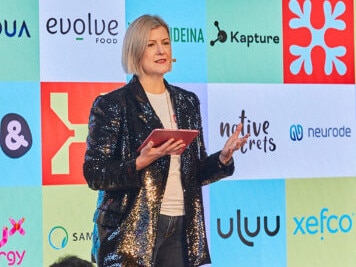Deep tech answers to world’s most wicked problem are right under our noses
The world faces existential crises, but deep tech can provide answers, as a recent Sydney conference showed, says Third Hemisphere’s Jeremy Liddle.

Jeremy Liddle, executive director of climate, tech and finance PR agency Third Hemisphere – and Stockhead columnist – says deep tech could have the answers to some of humanity’s most wicked problems, as a recent Sydney conference showed. Let him explain …
Humanity is at a crossroads.
On the one hand, there is a strong temptation to continue business as usual, and avoid the hard changes required to create planetary-level change to save, well, the planet.
This temptation is driven by multiple forces.
“Naive realism” (the belief that our personal experience is reality) combined with “recency bias” (placing more weight on recent events versus past or future) leaves people insensitive to global proof points and disasters in favour of their own personal circumstances.
Disinformation campaigns, proliferated by Big Fossil Fuel, then exacerbate this belief.
And “solution aversion” motivates people to deny the scientific evidence behind climate change when they are averse to the solutions.
For the best columnists, sign up here for free Stockhead daily newsletters
The aversion to a potential financial penalty (and possible extinction!) is obvious in the case of Big Fossil Fuel.
But this also extends to blue collar workers within the coal or gas industries, or beneficiaries of significant campaign donations.
But on the other hand, there is strong global scientific consensus that the Earth is warming and that this warming is predominantly caused by human activities.
This simply must be the position we act on – and fast.
So how exactly does an entire planet go about making the global structural and systemic change required to halt the devastation of our species, habitat, and lives as we know them?
Reset through deep technologies
Saying no to a plastic straw in your mojito is obviously better than nothing.
But tiny actions by individuals are not going to solve the wicked and globally-pervasive problem of climate change.
Instead, we must reset our entire relationship to resources and waste, our cities, health, nature, time, and legacy technologies.
At the recent Cicada x Tech23 conference in Sydney, 23 science and engineering-based deep tech founders presented revolutionary solutions to a wide range of issues ailing our Earth.
MORE FROM STOCKHEAD: How to spot a multibagger | Brokers excited by AI road safety tech firm | Emerging markets great place to build
But these solutions aren’t siloed into singular technologies or industries.
As Sally-Ann Williams, CEO of Cicada Innovations, put it: “Deep technologies are remarkable breakthroughs in science and engineering, with the potential to have a far-reaching impact on big, seemingly intractable, issues in the world.”

“Deep tech ventures, like the 23 companies at Tech23, are finding commercial applications for these innovations.
“But to really understand the impact of deep tech ventures, we must think systemically, not through niches of technology or individual industries.”
Williams points out that these ventures may use or develop innovations in fields such as AI, biotech, robotics, and quantum.
But it’s rare for these innovations to have applications in one sector alone, such as aerospace or medicine.
She explained: “We might see space technologies used to monitor agricultural conditions or provide healthcare solutions, or an AI technology might be applied both to the monitoring of a patient and as a smart cities solution. These are just two of many examples.”
To emphasise this systems approach, the companies at Tech23 were organised around solution targets, such as “rebuilding and adapting our existing urban environments to create sustainable, smart, and biodiverse cities that promote health, community, and the environment”, or “mimicking the interconnectedness of the natural ecosystem to rethink food production, healthcare, manufacturing, and energy”.
Climate change is a problem and theme that runs through all of these systems, and to think about them holistically we must also think about supply chains and demand.
Visit Stockhead, where ASX small caps are big deals
Thinking upstream and downstream
One of humanity’s largest climate challenges is its relationship to resources.
Whether it’s an everyday material such as plastic, consumer goods like textiles, or a critical element such as lithium, there are countless opportunities to limit or avoid waste.
This requires transforming how we make goods and materials upstream and take care of the waste we have already created downstream.
And the Tech23 topic of “ending waste and creating circular economies by using innovations like biology, nanotechnology, and AI” was a great example of this in action.
For example, waste from plastic pollution is one of our most pervasive problems (not-so-fun fact: a lake in Brisbane was recently named one of the most polluted by microplastics globally).
So imagine if we could replace petroleum-based plastics, 90 per cent of which are made from virgin material mined from the planet, with sustainably sourced, regenerative seaweed bioplastics, and sequester carbon from the atmosphere at the same time?
Tech23 company Kelpy has done just that, developing a bioplastic capable of replacing both soft and rigid single-use plastic products, which then break down easily after being used.
And what of the plastics we have produced, that continue to pollute the Earth? Tech23’s Samsara Eco has made infinite plastic recycling possible through its enzymatic technology that breaks down fossil-plastics into basic chemical building blocks. These can then replace the need for new virgin plastics.
But plastic is just one of so many contributors to waste. Even products being used for sustainable and renewable practices, such as batteries, require minerals like lithium, which then requires resource-intensive and wasteful extraction and processing.
ElectraLith has developed a clean, fast, sustainable and cost-effective lithium extraction process that, unlike traditional extraction, does not require evaporation, precipitation, and chemical treatment.
And then there is the manufacturing of textiles, which, in its finishing and dyeing process, is responsible for 20 per cent of global water pollution and 3 per cent of global carbon emissions.
Harnessing the unique properties of plasma, Xefco has created a highly efficient, water-free solution for textile dyeing and finishing, taking on one of the world’s biggest manufacturing industries.
By tackling the problem of waste from multiple angles both upstream and downstream, these companies are creating a whole new set of sustainable options for consumers.
We may just be able to say yes to completely guilt-free plastic straws at the bar in the future after all.
Federal Industry and Science Minister Ed Husic, speaking at the Cicada x Tech23 event, praised the theme of “thinking in systems, not silos”.
“ (This recognises) that the challenges that lie ahead of us need diverse voices and skills,” he said.
“This success isn’t a solo endeavour. In fact, it is the intersection between us as designers, as builders, users, thinkers, creators, and lawmakers that we usually gain the greatest insights.” Only by harnessing the power of deep tech can an entire planet make the global structural changes required to halt and reverse the devastation of our planet.
This article was developed in collaboration with Third Hemisphere, a Stockhead advertiser at the time of publishing. This article does not constitute financial product advice. You should consider obtaining independent advice before making any financial decisions.
Cicada Innovations was a client of Third Hemisphere at the time of publishing. Jeremy Liddle is also a Limited Partner in Main Sequence Ventures Fund II, which is a shareholder in Samsara Eco.
This content first appeared on stockhead.com.au
SUBSCRIBE
Get the latest Stockhead news delivered free to your inbox. Click here


